Tattooing and body piercing are forms of body art that can be provided by a licensed individual or, in some states, a medical practitioner.
Depending on which country you are in will determine the type of consent required when providing body art to minors. In most cases, this is done using a consent form.
Because of the permanent nature and somewhat invasive procedures, you aren’t allowed to tattoo or pierce a minor without written consent from the minor’s legal parent/guardian. In some states, the parent/guardian needs to be present at the time of the procedure as well. Some countries won’t allow body art procedures on minors at all, and each state has different penalties for not adhering to the laws.
What is a Tattoo Consent Form?
A tattoo and body piercing consent form allow a tattoo artist or piercer to protect themselves from liability should an unforeseen accident occur during a procedure.
It can be used for adults to make sure they understand the process and any adverse side effects, as well as for minors, to make sure parents have consented to the procedure. In all cases, a consent form needs to outline the process being done, any risks, side-effects, aftercare, and any other essential details that you need to make clear before a procedure.
Generally, separate forms are used for tattooing and piercing. You can download any of our free templates and examples to get a better idea of what the consent form entails and what should be on it for your state.
Free Forms & Templates
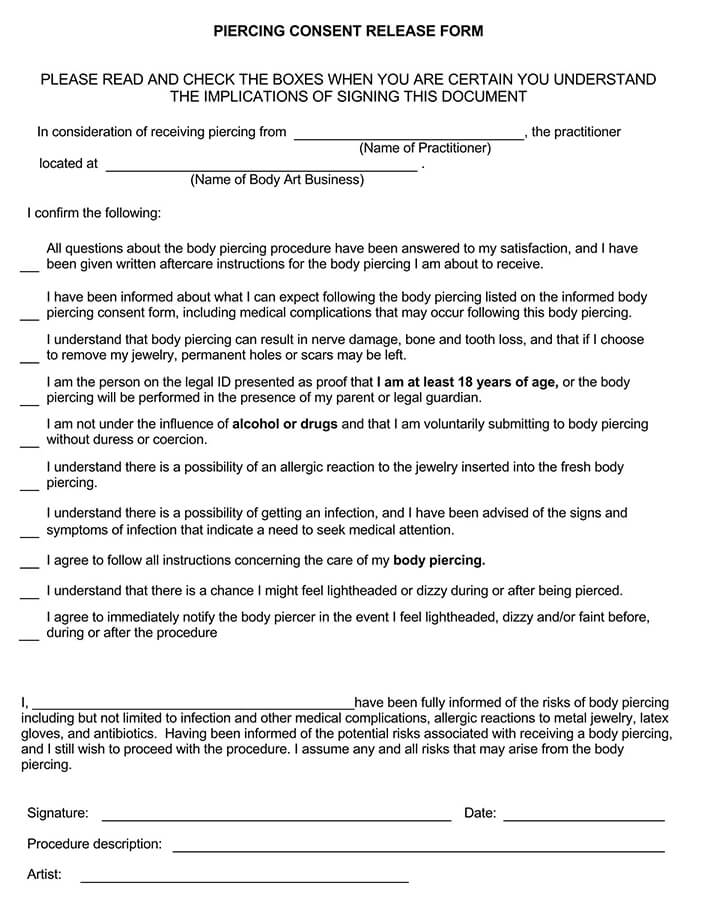
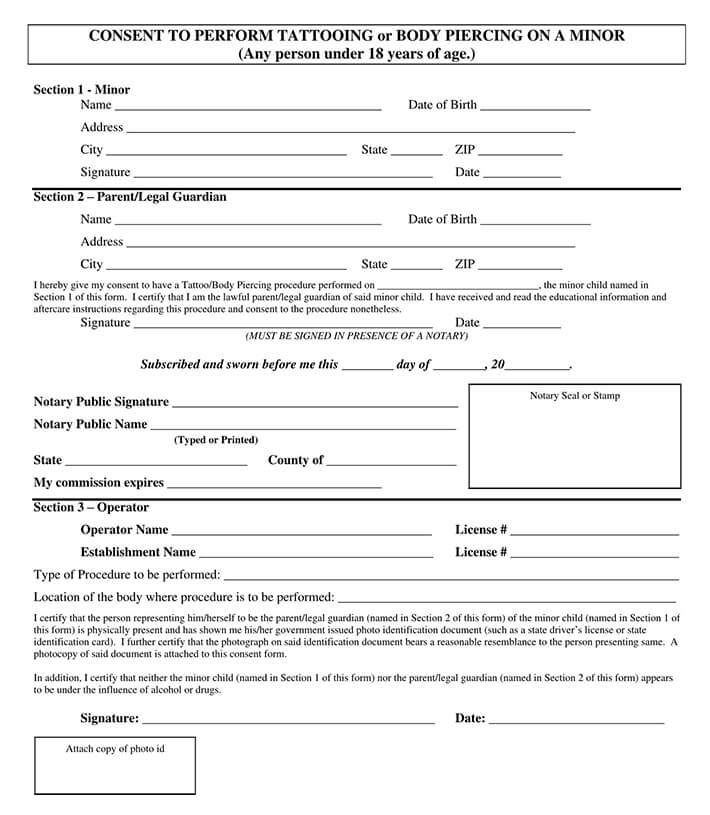
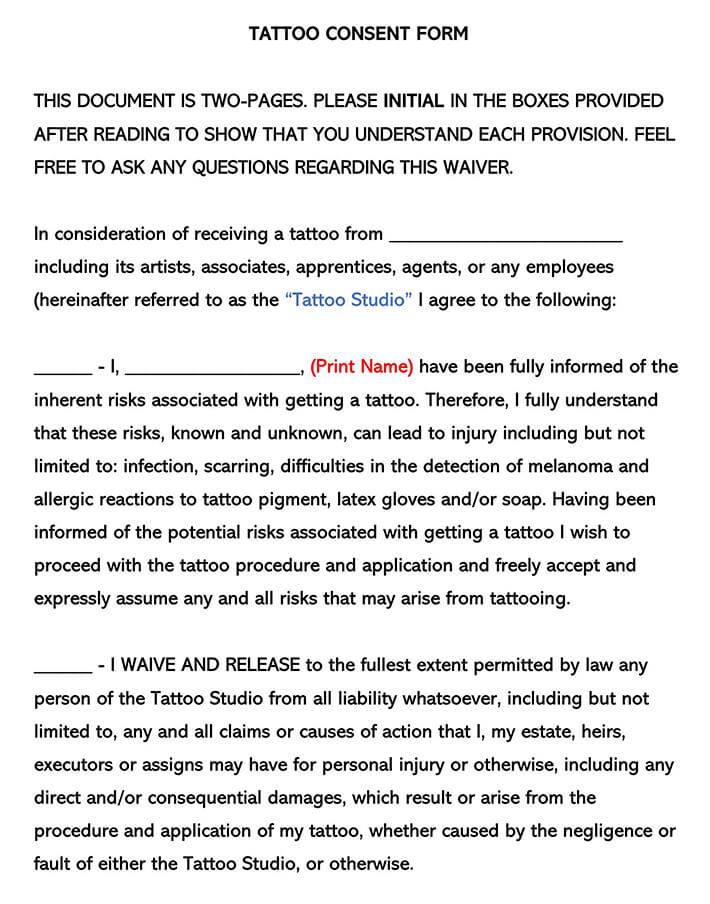
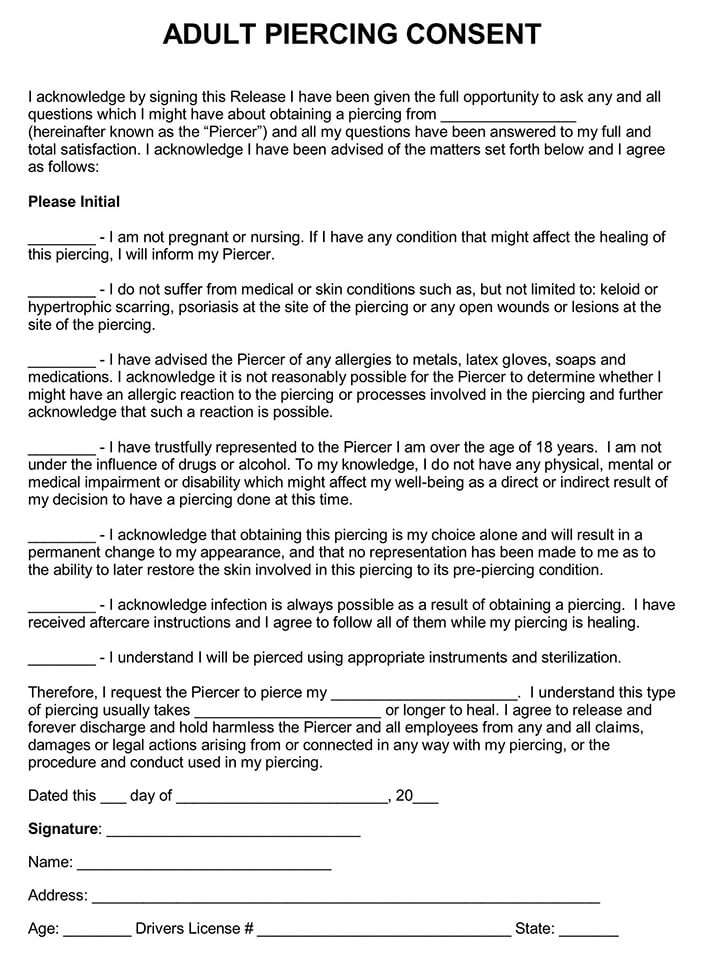
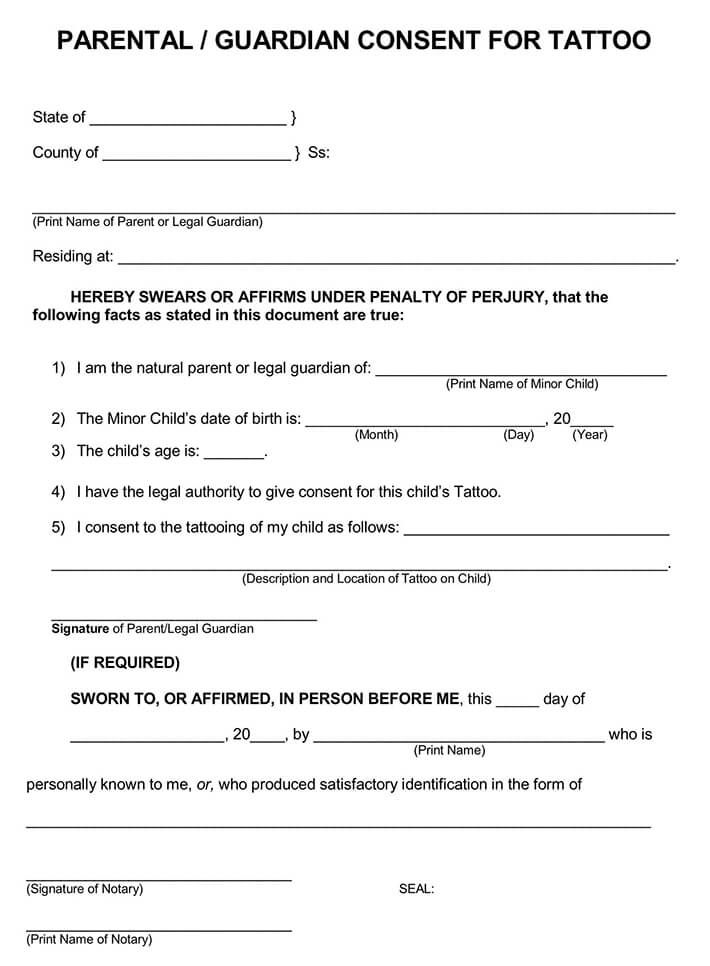
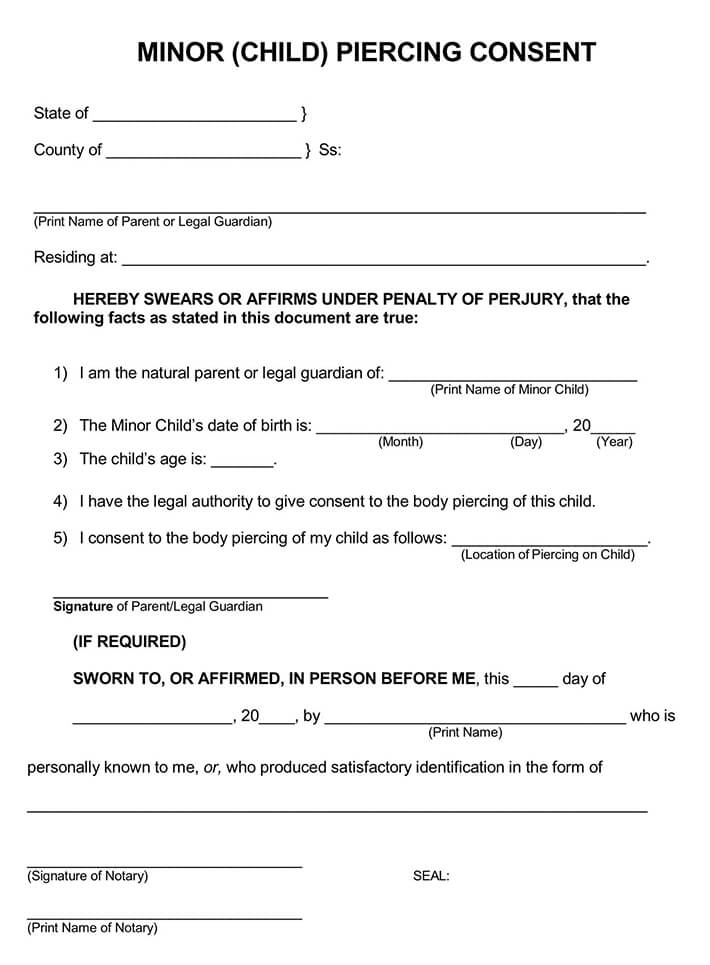
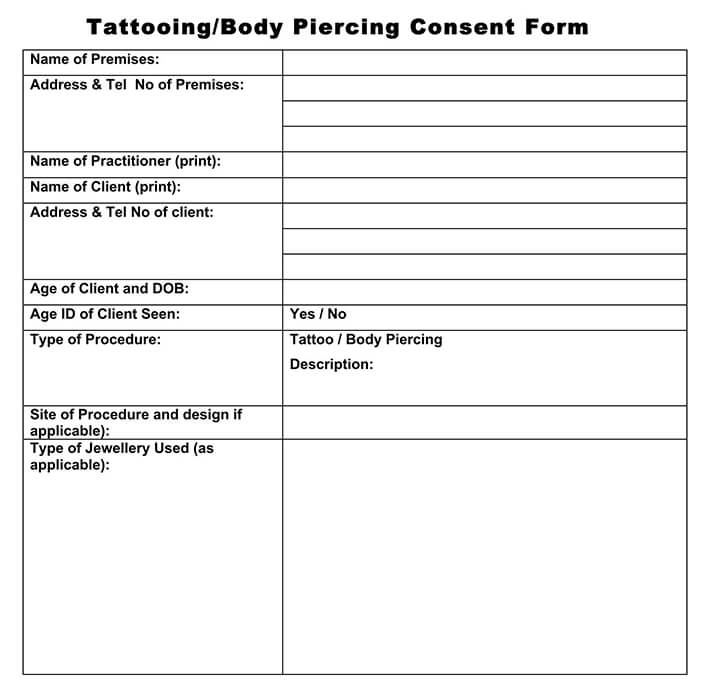
What Information Should be Included in the Consent Form?
The consent form needs to provide clear information to the patron of the health risks that are associated with both tattooing and piercing. Once the patron understands and agrees, the need to sign the consent form. There are several sections that the patron will need to initial and sign.
There should also be a release and wave section for the patron to sign that releases the tattooer and the studio from liability should injury or other damage occur to the person as a result of having the procedure done.
Patrons will need to sign off to state they were able to ask questions and that the information given was appropriate and understandable, including aftercare instructions. Lastly, the patron needs to sign off on a section stating that they are not under the influence of any drugs or alcohol, that they are not on any medication, nor have any conditions that could interfere with the procedure, and that they are freely and willingly giving consent to having the tattoo/piercing.
Other details that the patron needs to understand are the potential for infection if they do not follow aftercare instructions, and that there can be colour variations from the image of the tattoo they have selected. They need to understand how both procedures are done and that they know these are permanent.
Laws for Each State
Almost all states have their laws regarding some aspects of body art. Forty-five states prohibit tattooing minors without parental consent and 38, which bans piercing and tattooing a minor without parental consent. The state of Nevada is the only state with no laws regarding body art, and Maryland has rules that are quite limited.
States that require written informed consent for minors (in some cases notarization of the consent form is needed)
- Alabama
- Colorado
- Connecticut
- Delaware
- Florida
- Hawaii
- Idaho – no one under 14 is allowed to be tattooed
- Kentucky
- Minnesota
- Nebraska
- New Jersey
- Utah
- Vermont
- West Virginia
Parent or Guardian must be present for the procedure in following states:
- Arizona
- Montana
- South Dakota
- Virginia
Both written informed consent and the presence of a legal parent/guardian at the time of the procedure:
- Arkansas
- Alaska
- California
- Illinois
- Indiana
- Kansas
- Louisiana
- Michigan
- Missouri
- New Hampshire
- North Dakota
- Ohio
- Pennsylvania
- Tennessee
States that do not allow any tattooing or piercing of a minor
- Washington D.C
- Iowa
- Maine – tattoo no, piercing yes
- Mississippi
- New York
- North Carolina
- South Carolina – for tattooing, no one under the age of 21 is allowed, but 18-year-olds may with parental consent. For piercing, no one under 18.
- Texas – no one under 18, except in situations where the parent/guardian feels it is in the minors best interest (for example, to cover a tattoo that is offensive or obscene)
- Washington
Specific penalties for some states
- Alabama – violations of their Tattoo & Body Piercing laws are considered to be a class C misdemeanour, and is punishable by 90 days imprisonment or a $100 fine per each violation.
- Arizona – violations are considered to be a class 6 felony.
- California – It is considered a misdemeanour for anyone to offer to tattoo or tattoo a minor (under 18)
- Illinois – only people with a licence to practise medicine are allowed to tattoo. It is a class A misdemeanour if done by anyone else. Under 18’s are not even allowed to remain on the premises where tattooing is being done unless they have a parent/legal guardian with them.
- Kansas – it is considered a class A misdemeanour to violate the tattoo and piercing laws.
- Missouri – violations of the tattoo and piercing laws are considered to be a misdemeanour and can be punishable by fines of p to $500.
- Montana – tattooing or body piercing a minor without parent/guardian consent can be charged with being guilty of “Unlawful transactions with children” and is punishable by fines up to $500, 6-months in jail, or both. Violations of the law not about children are considered a misdemeanour and are punishable by fines between $50 to $100 if it’s a first offence. Anything over a third offence is punishable by fines up to $300, 90 days in jail, or both.
- Minnesota – violation of the tattoo and piercing laws are considered to be a class A misdemeanour.
- Mississippi – the violation of the tattoo and piercing laws are considered a misdemeanour and are fined up to $500.
- Missouri – the violation of the tattoo and piercing laws are considered a misdemeanour and face fines up to $500 for first offenders. Repeat offenders that occur in a year of the first offence can be fined between $500 to $1,000.
- New York – violating this state’s law is considered to be “unlawfully dealing with a child in the second degree” and is classed as a class B misdemeanour.
- North Dakota – violating the tattoo and piercing laws, as well as selling any tattooing or piercing equipment to a minor are considered class B misdemeanours.
- Oregon – violating their body art laws is considered a misdemeanour. Violation of the rules of the Health Licensing Office is also finable.
- Rhode Island – It is considered a criminal offence (misdemeanour) to tattoo a minor, and you face fines of up to $300.
- South Carolina – violating the health code laws regarding piercing and tattooing are considered a misdemeanour and can face fines up to $2,500, face one year in prison, or both.
- South Dakota – it is considered a class 2 misdemeanour to tattoo anyone under 18.
- Tennessee – any minors caught misrepresenting their age to get tattooed or pierced are considered to be performing an act of delinquency and must pay a fine from $50–$250 as well as serve 20 hours or more of community service. It is also a class B misdemeanour to either tattoo or breach the laws for body piercing.
- Texas– it is a class B misdemeanour for a minor to lie about their age to get pierced or tattooed without the consent of a parent or Guardian.
- Utah – any piercing or tattooing of a minor is considered a class B misdemeanour with fines up to $1,000 per violation.
- Virginia – any tattooing or body piercing of a minor is considered a class 1 misdemeanour.
- Washington – any tattooing of any under 18 is deemed illegal and considered a misdemeanour.
- Wisconsin – even offering to tattoo a minor in this state is subject to a fine of up to $200.
- Wyoming – violating the tattooing and piercing laws are considered to be a misdemeanour criminal offence and is punishable by a fine and prison time.
Frequently Asked Questions
No, it is against the law to tattoo any part of the body of anyone under 18 years of age without written and notarized consent from the Parent or Legal Guardian of the minor.
In most states, only legal parents or guardians are allowed to give consent.
In most states, you have to be at least 18 to give consent for a tattoo.










